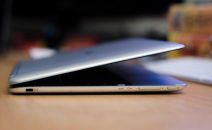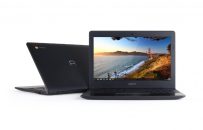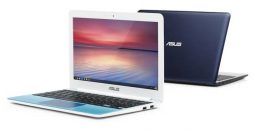Google’s Chromebook laptop series thrives on being unique in the laptop market. This requires constant vigilance from Google to stay ahead of the curve. From what we’ve recently learned about upcoming Chromebook features, it looks like Google is having no problem running on the cutting edge.
Chromebooks have always been an oddity in a laptop world dominated by Microsoft and Apple. While most other laptops boast their operating system as their foundation, Chromebooks mixed up the market by essentially not having an operating system.
Granted, that isn’t entirely accurately. They technically do have a Chrome operating system, but it’s as bare bones as possible. Google Drive already had basically a full set of operating system apps, so developing those into an operating system was a natural transition.
Chromebooks generally rely on an internet connection because most of the apps are run on the cloud. However, they still do ship with ample hard drive space. It may not be as much hard drive space as the top of the line laptops, but Chromebooks aim for the different crowd.
Here’s my personal example. I have a powerful computer at home, but I’m a writer. How can I be expected to write on a machine loaded with movies, music, and more games than I could ever play?
I wanted a small, simple, cheap laptop that I could take away from home so I could focus on my writing. This is exactly what Chromebooks are perfect for. They’re not high performance gaming machines, they’re incredibly useful tools for getting work done on the go.
I’d be perfectly happy with Chromebooks even if they never added new features ever. However, Google is introducing some exciting features for the upcoming Chromebooks that will improve security, productivity, and flat out fun. Here’s a preview of what’s coming up.
Pressure Sensitive Touchscreens
Touchscreen systems revolutionized modern technology. It started with the iPhone, and now everyone has a touchscreen phone in their pocket. Now we see the trend of touchscreen laptops and monitors becoming the industry standard.
Many people are predicting that pressure sensitive touchscreens are the next logical step in the evolution of the modern touchscreen. Apple has already introduced their pressure sensitive tech called “3D Touch,” and Google announced plans to introduce pressure sensitive touch to Android devices, though the plans were delayed.
Now Google plans to bring pressure sensitive touch to their Chromebooks. What does this mean? Right now, honestly, not a whole lot.
So far, we can just get a preview of the options this opens up on Apple’s “3D touch.” So far, they’ve mostly used pressure sensitive touch to allow quicker access to extra toolbars and shortcuts on apps. For example, you can hard press on the Instagram app, then slide to “New post” to instantly open the app to the upload screen. Rather than taking two seconds, it’ll take one second.
Unless you’re the literal busiest person on the planet, this probably doesn’t mean a lot to you. But consider two things. One, this is only the start. Perhaps as the technology evolves, we’ll realize new potential for pressure sensitive touch. Secondly, is it awesome? Yes, it’s awesome. And let’s be honest, that’s the true foundation for all technological advance.
Finger Print Detection
Fingerprint detection is another hot trend in smartphones right now, and it’s another smartphones trend Google is looking to bring to their line of Chromebooks.
At the start, you’ll be able to login to your Chromebook simply using your finger. We can see related trends happening with Windows 10 anniversary update, which introduces the feature to login to Windows through facial recognition.
At the moment, this news also may not seem so exciting. It’s sci-fi and awesome, which again is important, but doesn’t help out daily life much. But again, this is just the beginning.
As this technology becomes more common, third party developers may jump on board. It’s possible that within five years, passwords will be a thing of the past. Passwords at the least are cumbersome and inconvenient. At the worst, passwords are vulnerable to security breaches and hacking.
Fingerprints could solve so much trouble while also being more convenient and also being more awesome. So much winning.







